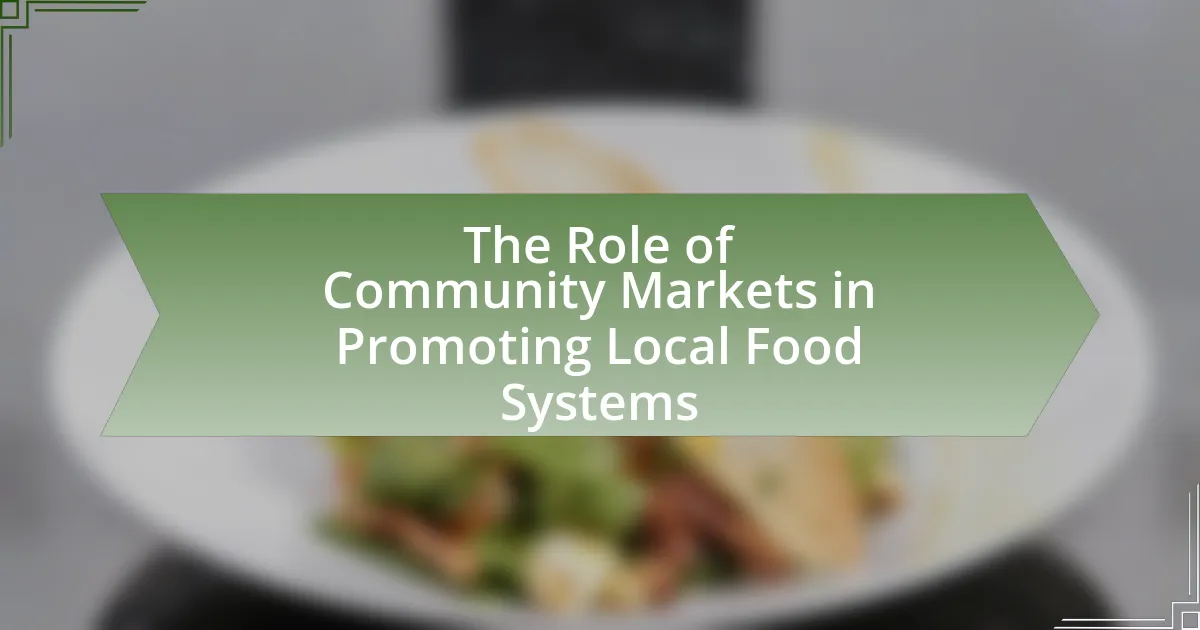The article focuses on engaging youth in local goods and the various programs designed to inspire future entrepreneurs. It outlines key components such as education, hands-on experience, community involvement, and mentorship that empower young individuals to participate actively in local economies. The article also discusses effective strategies for attracting youth participation, the role of community partnerships, and the importance of fostering entrepreneurship through local goods. Additionally, it addresses challenges faced by programs, misconceptions about local products, and best practices for sustaining youth engagement, emphasizing the significance of community support and feedback in enhancing program effectiveness.

What are the key components of engaging youth in local goods?
The key components of engaging youth in local goods include education, hands-on experience, community involvement, and mentorship. Education provides youth with knowledge about local products and their benefits, fostering an appreciation for local economies. Hands-on experience, such as workshops or internships, allows youth to actively participate in the production and marketing of local goods, enhancing their skills and confidence. Community involvement encourages youth to connect with local businesses and initiatives, creating a sense of belonging and responsibility. Mentorship from local entrepreneurs offers guidance and support, helping youth navigate their entrepreneurial journeys. These components collectively empower youth to become active participants in their local economies.
How do local goods programs attract youth participation?
Local goods programs attract youth participation by offering hands-on experiences that foster entrepreneurship and community engagement. These programs often provide opportunities for young people to develop skills in areas such as marketing, product development, and business management, which are essential for future entrepreneurial endeavors. For instance, programs that involve local farmers’ markets or craft fairs allow youth to interact directly with local producers, enhancing their understanding of the local economy and the importance of supporting it. Research indicates that youth who participate in such programs are more likely to develop a sense of belonging and responsibility towards their community, which further motivates their involvement.
What strategies are effective in promoting local goods to young people?
Effective strategies for promoting local goods to young people include leveraging social media platforms, creating engaging community events, and collaborating with local influencers. Social media platforms like Instagram and TikTok are particularly effective, as 72% of teens use these platforms, allowing brands to reach young audiences directly and creatively. Community events, such as farmers’ markets or local fairs, provide interactive experiences that foster a connection between young consumers and local products. Collaborating with local influencers can amplify reach, as 49% of young people trust recommendations from influencers, making them more likely to support local goods. These strategies collectively enhance visibility and appeal, driving interest and sales among young consumers.
How do community partnerships enhance youth engagement in local goods?
Community partnerships enhance youth engagement in local goods by providing resources, mentorship, and opportunities for hands-on experience. These collaborations often involve local businesses, schools, and non-profit organizations that create programs aimed at teaching youth about local products and entrepreneurship. For instance, initiatives like farmer’s markets or local craft fairs allow young people to interact directly with local goods, fostering a sense of ownership and responsibility. Research from the National Youth Leadership Council indicates that youth involved in community service projects, particularly those linked to local economies, show increased interest in entrepreneurship and civic engagement. This evidence supports the notion that community partnerships are effective in motivating youth to engage with and support local goods.
Why is it important to inspire future entrepreneurs through local goods?
Inspiring future entrepreneurs through local goods is crucial because it fosters community engagement and economic sustainability. By encouraging young individuals to explore and invest in local products, they develop a sense of ownership and responsibility towards their community. This engagement can lead to increased local employment opportunities, as small businesses often create more jobs than larger corporations. According to the American Independent Business Alliance, local businesses generate three times more economic activity per dollar than chain stores, highlighting the significant impact of supporting local entrepreneurship. Furthermore, inspiring youth to focus on local goods can cultivate innovation and creativity, as they are motivated to solve community-specific problems through their entrepreneurial ventures.
What skills do youth develop through participation in local goods programs?
Youth develop skills such as entrepreneurship, teamwork, communication, and problem-solving through participation in local goods programs. These programs often involve hands-on experiences where youth engage in creating, marketing, and selling local products, which fosters entrepreneurial thinking. For instance, a study by the National Youth Entrepreneurship Initiative found that youth involved in such programs reported a 30% increase in their ability to work collaboratively and communicate effectively. Additionally, they learn to identify community needs and develop solutions, enhancing their problem-solving capabilities.
How does engaging youth in local goods contribute to community development?
Engaging youth in local goods significantly contributes to community development by fostering economic growth and social cohesion. When young individuals participate in local markets, they stimulate local economies through increased demand for products and services, which can lead to job creation and entrepreneurship opportunities. For instance, a study by the National Youth Entrepreneurship Foundation found that youth-led businesses can increase local employment rates by up to 15% in small communities. Additionally, involving youth in local goods promotes a sense of ownership and responsibility towards their community, encouraging them to invest in its well-being and sustainability. This engagement not only enhances their skills and confidence but also strengthens community ties, leading to a more vibrant and resilient local culture.

What types of programs exist to engage youth in local goods?
Programs that engage youth in local goods include community-supported agriculture (CSA) initiatives, local entrepreneurship workshops, and youth-led farmers’ markets. These programs provide hands-on experiences that connect young people with local food systems and businesses. For instance, CSAs allow youth to participate in the growing and distribution of local produce, fostering an understanding of sustainable agriculture. Entrepreneurship workshops often include mentorship from local business owners, teaching youth about product development and marketing strategies relevant to local goods. Youth-led farmers’ markets empower young individuals to manage and operate market stalls, enhancing their business skills while promoting local products. These programs have been shown to increase youth awareness of local economies and encourage future entrepreneurial endeavors.
How do educational programs foster entrepreneurship among youth?
Educational programs foster entrepreneurship among youth by providing essential skills, knowledge, and resources that encourage innovative thinking and business acumen. These programs often include hands-on experiences, mentorship opportunities, and access to funding, which collectively empower young individuals to develop and implement their business ideas. For instance, research conducted by the Global Entrepreneurship Monitor indicates that youth who participate in structured entrepreneurship education are 1.5 times more likely to start a business compared to those who do not engage in such programs. This evidence highlights the effectiveness of educational initiatives in cultivating an entrepreneurial mindset and practical capabilities among young people.
What are the key features of successful educational programs in local goods?
Successful educational programs in local goods feature hands-on learning experiences, community involvement, and a focus on sustainability. Hands-on learning allows participants to engage directly with local products, enhancing their understanding and appreciation. Community involvement fosters connections between youth and local producers, creating a sense of ownership and responsibility. A focus on sustainability ensures that programs teach the importance of environmentally friendly practices, which is increasingly relevant in today’s economy. These elements collectively contribute to the effectiveness of educational initiatives aimed at inspiring future entrepreneurs in local goods.
How do mentorship opportunities enhance youth entrepreneurship?
Mentorship opportunities enhance youth entrepreneurship by providing guidance, knowledge, and networking that are crucial for developing business skills. Mentors share their experiences, helping young entrepreneurs navigate challenges and avoid common pitfalls. For instance, a study by the Kauffman Foundation found that youth who engage with mentors are 55% more likely to start a business compared to those without mentorship. This statistic underscores the significant impact mentorship has on fostering entrepreneurial initiatives among young individuals.
What role do hands-on experiences play in engaging youth?
Hands-on experiences play a crucial role in engaging youth by fostering active participation and practical learning. These experiences allow young individuals to apply theoretical knowledge in real-world contexts, enhancing their understanding and retention of information. Research indicates that experiential learning significantly increases motivation and interest in subjects, as evidenced by a study published in the Journal of Educational Psychology, which found that students who participated in hands-on activities scored 20% higher on assessments compared to those who learned through traditional methods. This engagement not only cultivates essential skills such as problem-solving and teamwork but also inspires entrepreneurial thinking, as youth see the tangible outcomes of their efforts in local goods initiatives.
How can local markets serve as a platform for youth entrepreneurs?
Local markets can serve as a platform for youth entrepreneurs by providing them with opportunities to showcase their products, gain practical business experience, and connect with their community. These markets often allow young individuals to set up stalls or booths, enabling them to sell handmade goods, food items, or services directly to consumers. This direct engagement fosters entrepreneurial skills such as marketing, customer service, and financial management.
Moreover, local markets can facilitate networking opportunities, where youth can meet other entrepreneurs, mentors, and potential investors, enhancing their business acumen and expanding their professional connections. Research indicates that youth participation in local markets can lead to increased confidence and a greater understanding of market dynamics, which are crucial for future business success.
What are the benefits of workshops and training sessions for youth?
Workshops and training sessions for youth provide essential skills development, enhance employability, and foster personal growth. These programs equip young individuals with practical knowledge and competencies that are directly applicable in the workforce, such as communication, teamwork, and problem-solving skills. According to a report by the National Youth Employment Coalition, youth who participate in structured training programs are 50% more likely to secure employment compared to those who do not engage in such activities. Additionally, workshops often promote networking opportunities, allowing youth to connect with mentors and industry professionals, which can lead to internships and job placements. Overall, these sessions play a crucial role in preparing youth for future entrepreneurial endeavors and career success.

What challenges do programs face in engaging youth with local goods?
Programs face several challenges in engaging youth with local goods, primarily including a lack of awareness and interest among young people. Many youth are not familiar with the benefits of supporting local products, which can lead to disinterest in local goods. Additionally, programs often struggle with limited resources for outreach and education, making it difficult to effectively communicate the value of local goods. Research indicates that only 30% of young consumers actively seek out local products, highlighting the need for targeted engagement strategies. Furthermore, competition from global brands and online shopping platforms can overshadow local offerings, making it challenging for programs to capture youth attention.
How can programs overcome barriers to youth participation?
Programs can overcome barriers to youth participation by implementing inclusive strategies that address accessibility, relevance, and engagement. For instance, providing transportation options and flexible scheduling can make participation easier for youth facing logistical challenges. Additionally, programs that align activities with the interests and aspirations of young people, such as entrepreneurship workshops that focus on local goods, can enhance relevance and motivation. Research indicates that youth are more likely to engage when they see a direct connection between program offerings and their personal goals, as highlighted in the study “Youth Engagement in Community Development” by the University of Minnesota, which found that tailored programs significantly increase participation rates.
What are common misconceptions about local goods among youth?
Common misconceptions about local goods among youth include the belief that local products are always more expensive than imported ones and that they lack variety or quality. Many young people assume that local goods are not competitive in price, despite studies showing that local products can often be more affordable due to reduced transportation costs. Additionally, youth may think that local goods are limited in selection; however, local markets often offer a diverse range of products, reflecting regional specialties and seasonal availability. These misconceptions can hinder youth engagement with local economies and entrepreneurship opportunities.
How can programs address issues of accessibility and inclusivity?
Programs can address issues of accessibility and inclusivity by implementing tailored strategies that ensure equal participation for all individuals, regardless of their backgrounds or abilities. For instance, programs can provide materials in multiple formats, such as braille or audio, to accommodate participants with visual impairments. Additionally, offering financial assistance or sliding scale fees can help lower economic barriers for underrepresented youth. Research indicates that inclusive programs, such as those highlighted in the “Youth Entrepreneurship Program” by the Kauffman Foundation, have successfully increased participation rates among diverse groups by 30% through targeted outreach and support services.
What are the best practices for sustaining youth engagement in local goods?
The best practices for sustaining youth engagement in local goods include creating hands-on experiences, fostering community partnerships, and providing mentorship opportunities. Hands-on experiences, such as workshops and local markets, allow youth to actively participate in the production and sale of local goods, enhancing their connection to the community. Community partnerships with local businesses and organizations can provide resources and support, making it easier for youth to engage in local initiatives. Additionally, mentorship opportunities from experienced entrepreneurs can guide youth in developing their skills and understanding the local economy, which has been shown to increase their long-term commitment to local goods. Research indicates that programs incorporating these elements have successfully increased youth participation and investment in local economies, demonstrating their effectiveness in sustaining engagement.
How can feedback from youth improve local goods programs?
Feedback from youth can significantly improve local goods programs by providing insights into their preferences and needs, which can lead to more relevant and appealing offerings. Engaging young people in the development process allows local goods programs to align products and services with current trends and values, such as sustainability and social responsibility. Research indicates that youth are more likely to support businesses that reflect their ideals, which can enhance community engagement and economic viability. For instance, a study by the Harvard Business Review found that businesses incorporating customer feedback, particularly from younger demographics, saw a 20% increase in customer satisfaction and loyalty. This demonstrates that youth feedback is not only valuable but essential for the success and adaptability of local goods programs.
What role does community support play in the success of these programs?
Community support is crucial for the success of programs that engage youth in local goods and inspire future entrepreneurs. This support fosters a sense of belonging and encourages participation, which can lead to increased motivation and commitment among young individuals. For instance, programs that receive backing from local businesses and organizations often benefit from mentorship opportunities, resources, and networking, enhancing the overall effectiveness of the initiatives. Research indicates that community involvement can significantly improve program outcomes, as seen in studies where youth entrepreneurship programs with strong local support reported higher rates of participant success and satisfaction.
What practical tips can be implemented to inspire future entrepreneurs?
To inspire future entrepreneurs, practical tips include fostering a culture of innovation through hands-on workshops and mentorship programs. These initiatives provide young individuals with real-world experience and guidance from established entrepreneurs, enhancing their skills and confidence. Research indicates that mentorship significantly increases the likelihood of entrepreneurial success; a study by the Kauffman Foundation found that entrepreneurs with mentors are 70% more likely to succeed in their ventures. Additionally, encouraging participation in local business competitions can stimulate creativity and problem-solving skills, as evidenced by programs like the Young Entrepreneurs Academy, which has successfully launched numerous youth-led businesses.




